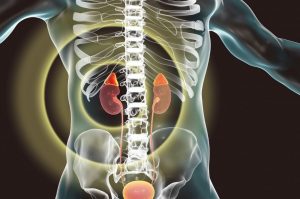
Kidney disease risk factors include diabetes, high blood pressure, a family history of kidney failure and being age 60 or older.
One in 3 American adults is at risk for kidney disease.
The National Kidney Foundation is the leading organization in the U.S. dedicated to the awareness, prevention and treatment of kidney disease for hundreds of thousands of healthcare professionals, millions of patients and their families, and tens of millions of Americans at risk.
What role do kidneys serve in our bodies?
 The kidneys are two fist-sized organs in your lower back.
The kidneys are two fist-sized organs in your lower back.
They maintain overall health through the following functions:
- Filtering waste out of 200 liters of blood each day.
- Regulating of the body’s salt, potassium and acid content.
- Removing of drugs from the body.
- Balancing the body’s fluids.
- Releasing hormones that regulate blood pressure.
- Producing an active form of vitamin D that promotes strong, healthy bones.
- Controlling the production of red blood cells.
Kidney disease risk factors facts:
- Kidney disease is the 9th leading cause of death in the country.
- More than 30 million Americans have kidney disease, and most don’t know it.
- There are over 95,000 people waiting for kidney transplants.
- More than 590,000 people have kidney failure in the US today.
According to the National Kidney Foundation Kidneys filter 200 liters of blood a day, help regulate blood pressure and direct red blood cell production.
But they are also prone to disease; 1 in 3 Americans is at risk for kidney disease due to diabetes, high blood pressure or a family history of kidney failure.
More than 30 Million Americans Already Have Kidney Disease
There are more than 30 million Americans who already have kidney disease, and most don’t know it because there are often no symptoms until the disease has progressed.
Because there are little to no signs of the condition, most people are not even aware that they have kidney disease until it reaches the later stages, including kidney failure.
If you have diabetes or high blood pressure, or a family history of kidney failure or heart disease, you are at greater risk for kidney disease.
The sooner you find out you have kidney disease, the sooner you can get treatment. By getting treatment early, you may be able to prevent or delay more serious health problems.

Diet and nutrition are an important part of living well with kidney disease. As your kidney dis-ease progresses, your dietary needs will likely change as well.
Be sure to talk with your healthcare practitioner about your individual nutrition needs.
Severe Symptoms
Chronic kidney disease (CKD) is a condition characterized by a gradual loss of kidney function over time.
The two main causes of chronic kidney disease are diabetes and high blood pressure, which are responsible for up to two-thirds of the cases.
Most people may not have any severe symptoms until their kidney disease is advanced.
However, you may notice that you feel more tired and have less energy, have trouble concentrating, have a poor appetite, have trouble sleeping, have muscle cramping at night, have swollen feet and ankles and have puffiness around your eyes.
Kidney disease risk factors include transplantation, which is sometimes an option and has many advantages such as a lifestyle free from dialysis and fewer fluid and dietary restrictions.
Kidney transplants, when successful, usually provide a better quality of life for most people, and they are less expensive than dialysis over time.
Assisting Hands® Home Care offers a wide range of in home care services for clients in need.
These services include: meal preparation, personal care, light housekeeping, companionship, elder care, fall prevention plans, care coordination and grocery shopping.
These services are provided by qualified & trained caregivers.
 If you have a transplant, take all your medications on schedule.
If you have a transplant, take all your medications on schedule.
Watch for any signs of infection, rejection, or other illness.
Ask for help when you need it.
Talk to your family and friends and other kidney patients.
Cultivate an appreciation of life, and do those things that are most meaningful and bring you the most joy.
Contact us to arrange care today.
